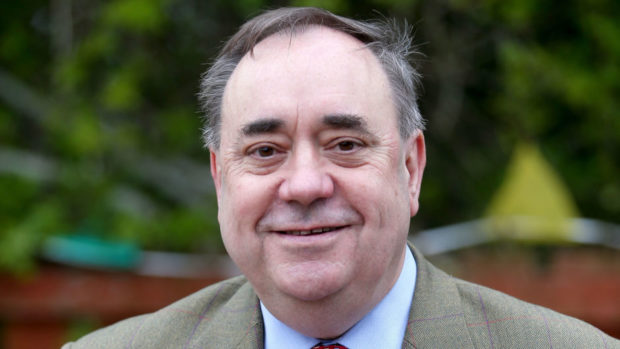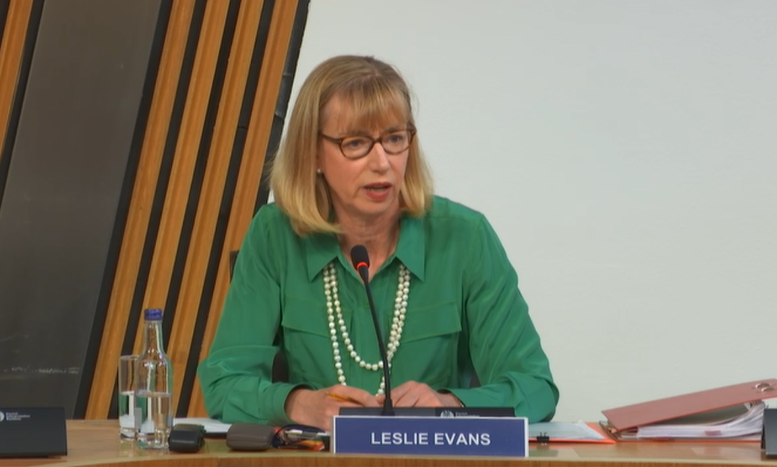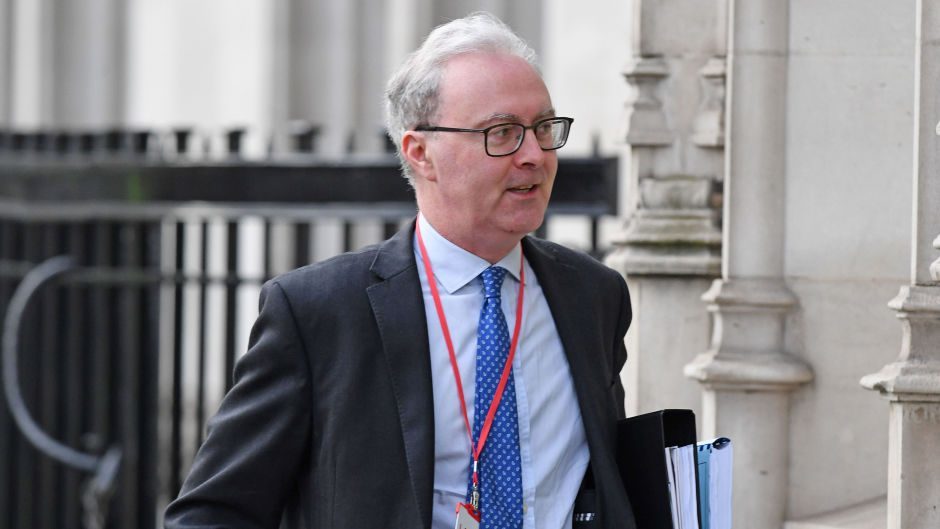Leslie Evans admitted she knew of rumours about Alex Salmond’s conduct and had discussed his behaviour with her predecessor.
Appearing in front of the Salmond inquiry for the second time, Ms Evans also told MSPs that around 10 employees had expressed concerns about their treatment in government, of which two went on to make formal complaints.
Ms Evans said the officials were concerned about their “treatment” and “experience” in government, but did not specify who or what had caused their disquiet.
The permanent secretary also spoke of her own experience of heated conversations with ministers but was unable to recall if Mr Salmond had ever shouted at her.
MSPs investigating the Scottish Government’s botched handling of harassment claims made against Mr Salmond quizzed Ms Evans about the working culture in her organisation.
Mr Salmond has denied allegations of bullying and harassment made against him.
She was then joined by Lord Advocate James Wolffe QC as MSPs turned their attention towards Mr Salmond’s successful legal challenge of the Scottish Government’s flawed internal inquiry into the former first minister’s conduct.
Mr Wolffe admitted it was “unsatisfactory” that the legal action had led to the Scottish Government shelling out £512,000 for Mr Salmond’s legal costs.
Ms Evans was also challenged on a text she sent following the collapse of the Scottish Government’s case in the judicial review, which stated: “We may have lost the battle, but we will win the war.”
The permanent secretary denied that she was “at war” with Mr Salmond and also rejected suggestions there had been a “fishing exercise” to encourage officials to raise concerns about inappropriate behaviour.
Ms Evans’s reappearance in front of the Salmond inquiry was also eagerly anticipated given her refusal to comment last time around on claims that female civil servants were advised against working alone with the ex-SNP leader.
Here are the main points to emerge when Ms Evans returned to Holyrood.
Rumours about Alex Salmond’s behaviour
Ms Evans was asked by Lib Dem committee member Alex Cole-Hamilton when she first knew of rumours about Mr Salmond’s behaviour
Mr Cole-Hamilton spoke of “an informal hum of rumours about bullying and sexually inappropriate behaviour by Alex Salmond and other ministers”.
He asked Ms Evans when she first picked up “on those rumours circulating around Mr Salmond’s behaviour?”
Ms Evans replied by saying she couldn’t comment on when she picked up on them, before adding: “I understand there were rumours.” The permanent secretary was then asked if she knew about them.
“Yes, absolutely. Yes I did,” she confirmed.
Mr Cole-Hamilton went on to mention evidence submitted by Ms Evans’s predecessor as permanent secretary, Sir Peter Housden. Sir Peter had suggested concerns about ministers had been dealt with informally when he was permanent secretary from June 2010 to June 2015.
“Did he ever discuss that quiet handling of concerns about ministers either formally or informally with yourself?” Mr Cole-Hamilton asked Ms Evans.
“We had conversations about conversations that I had had with individuals about Mr Salmond’s behaviour,” Ms Evans replied.
But when she was succeeding Sir Peter in the summer of 2015, Ms Evans said she could not recall discussing concerns about ministers with the man she was taking over from.
Almost as an aside when discussing the rumours about Mr Salmond, Mr Cole-Hamilton asked Ms Evans if she had ever been shouted at by the former first minister.
“I don’t remember him shouting at me,” the permanent secretary replied.
Evans says she was shouted at by ministers but ‘it didn’t cross the line’
Mr Cole-Hamilton’s question about shouting was triggered by an earlier exchange between Ms Evans and the Conservative MSP Murdo Fraser.
Mr Fraser asked her if she had ever experienced “bullying behaviour” in her civil service career and if she had been on the “receiving end” of shouting from a minister.
I think there is a line to be drawn and I would draw it between passion, commitment and the occasional losing of temper and where behaviour crosses that line – that’s different.”
Leslie Evans, Permanent Secretary
“I think, over my career as a whole, I have had people shout at me. I suspect there are very few people who haven’t and that includes the civil service,” Ms Evans said, before confirming that ministers would be among those to have raised their voices.
She added that the instances should be put “in context” and were not a “daily occurrence”.
Ms Evans argued there was a “unique relationship” between civil servants and ministers.
“It is unlike anything else. That’s not to say it doesn’t have conditions and criteria government, of course, for good behaviour,” Ms Evans said. “But I think if you’d asked anybody who’d worked in any organisation: have you ever had a conversation with somebody else and has that ended up with some shouting? Not very often but it has happened. And understand that people are passionate, committed and hard working in the civil service and with the ministers I have worked with as well. However, I think there is a line to be drawn and I would draw it between passion, commitment and the occasional losing of temper and where behaviour crosses that line – that’s different.”
When asked by Mr Fraser if the line had been crossed in her own experience, Ms Evans answered: “In terms of people shouting at me, no.”
MSPs told 10 individuals raised concerns, as Evans denies claims of a fishing expedition
A crucial part of the inquiry is the role played by Judith MacKinnon, the investigating officer who led the Scottish Government’s internal inquiry into the claims against Mr Salmond, which he later successfully challenged in court.
Mr Cole-Hamilton told the inquiry that Ms MacKinnon met those expressing concern and “subsequently revealed to a potential complainer the existence of other possible complainers”.
Ms Evans said she was unaware that happened but added that it was “not unusual” for people to be told other complaints could be coming forward.
Mr Cole-Hamilton then asked the permanent secretary if, in retrospect, this could be seen as “something of a fishing expedition”.
“No,” Ms Evans replied. “It is so important we get this absolutely on the record. There was no fishing expedition. There were a number of people – 10 – around, I have learnt, who were raising concerns about their treatment and their experience in the government at that time.
“Two of those decided to take that, quite legitimately, into the procedure that was marked complaint, i.e. formalising it. This apparent confection that there was some kind of fishing exercise encouraging people to do this – that they were somehow trying to be preyed upon in some way – goes against everything that’s in the professional HR – the DNA – of a professional HR person.”
An explanation for a text stating: ‘We may have lost the battle but we will win the war’
Mr Fraser drew attention to reports that Ms Evans had sent her text after the Scottish Government lost the judicial review that Mr Salmond brought against it.
He asked her what she meant by: “We may have lost the battle, but we will win the war.”
Ms Evans claimed the text had been “misinterpreted as having some kind of conspiratorial element to it”.
“Can I clearly say, that is not the case,” she added. “I have been working since I was first appointed as permanent secretary on July 1 2015 to make the organisation more inclusive, diverse, an organisation that respected everybody’s right to come to work and to have the right kind of conditions at work. That equality was at the heart of business of government and was at the heart of organisational culture. So I was not referring to any individual when I sent that text. I was talking about the long-term commitment of mine and indeed the Scottish Government, as you will see from its policy documents, to ensure that equality lies at the heart of what it does, but also how it operates as an organisation.”
After her explanation, Mr Fraser posed the question: “So you weren’t at war with Alex Salmond?
Ms Evans replied: “No.”
The £512,000 paid out by the Scottish Government for Salmond’s legal costs
The sum paid out for Mr Salmond’s legal costs was discussed as lawyers for the former first minister said they were willing to go back to court in an attempt to give MSPs access to documents being withheld by the government.
The offer, which was made provided the Holyrood inquiry met the costs, came to light just as Ms Evans and Ms Wolffe began to take questions.
Mr Wolffe was asked by Mr Fraser about the £512,000 in public money that the Scottish Government ended up paying for Mr Salmond’s legal fees after he won the judicial review.
The Lord Advocate suggested the amount paid out was down to the length of time it took for the Scottish Government to realise that its case was flawed.
He described it as a “reflection of the way in which disclosure of documents emerged during the course of the litigation”.
He admitted it was “unsatisfactory” that the Scottish Government conceded the case “very late in the day” based on documents that had “taken some time” to be produced.
“It’s a reflection of the course of the litigation and a reflection of the legitimate expectation that as far as possible the government will identify the material at an early stage,” Mr Wolffe said.
“That didn’t happen in this case, and the consequence followed. It was entirely right that an additional fee be paid.”


